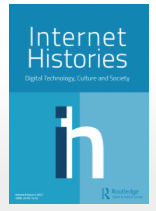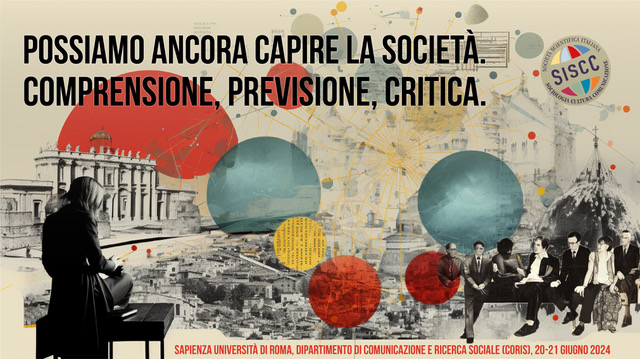Special issue of Internet Histories: Digital Technology, Culture and Society
(editors of the special issue: Leopoldina Fortunati, Autumn Edwards & Janet Abbate)
This call for papers will take stock of the historical entanglement of gender and the Internet/Web. Facing a critical juncture both in terms of the technological development of the Internet (e.g., the nascent Web 3.0, radical decentralization, the integration of AI and machine learning) and also in terms of sociopolitical struggle on the part of women and gender-linked identity groups on local and global levels, we ask: How can we root the analysis of gender and the Internet on a historical level? How can histories that integrate gender and the Internet/Web help us comprehend the sociological, cultural, and political meaning and dimensions of each?
This special issue will explore these questions and many others through a diachronic approach that includes global, transnational, national, regional, and local histories.
Suggested topics:
The construction of gender, including its intersectionality with race, on the Internet
Feminism on the web, gender activism, and social movements
Masculine cultures and the Internet/Web
Participation of women online, including structural/cultural obstacles and varying national patterns
Women’s expertise as Internet builders (e.g., Jake Feinler), managers, hackers, influencers, bloggers, content moderators, coders, etc.
Gender and imaginaries of the Internet, including advertising
Gender communities and social solidarity, including LGBTQ+ communities Gendered controversies and anti-woman movements online (e.g., trolling, gamergate, #metoo, etc.)
Gender and the Internet of Things
Gender and the mobile Internet
Gender and online gaming
Gender and the immaterial labor of domestic reproduction Gender and digital labor, including relational/affective labor
In addition, we encourage and welcome other topics and perspectives on gender and Internet/ Web Histories.
Submissions
The proposals are to be submitted to
explicitly mentioning CFP Gender and Internet/Web History
- They need to be a maximum of 250 words, detail an explicit angle of analysis and outline, and integrate a short bibliography.
- Selected authors will be invited to submit a full paper through the editorial system, which will undergo full peer review and determine acceptance of papers for publication.
- No payment from the authors will be required.
Time schedule
- Deadline for the submission of proposals: February 28th, 2023
- Notification of proposal acceptance: April 1st, 2023
- Submissions of the full paper (6000-8000 words): March 1st, 2024
- Feedback based on reviews: May 31st, 2024
- Deadline for Revisions: August 31st, 2024
- Publication will begin in 2025
Journal Information
- Internet Histories: Digital Technology, Culture and Society is an international, inter- disciplinary peer-reviewed journal concerned with research on the cultural, social, political and technological histories of the internet and associated digital cultures.
- More information on the journal
- Should you have any questions regarding this CfP, please feel free to contact us: leopoldina.fortunati@uniud.it; autumn.edwards@wmich.edu; abbate@vt.edu
About the Guest Editors
Leopoldina Fortunati, senior professor, teaches Social Robotics at the University of Udine, Italy. She is ICA fellow and member of the Academia Europaea. She is associate editor of the journal The Information Society. Her research interests focus on feminist and gender perspective in respect to the adoption and appropriation of digital technologies, on the role especially of the mobile phone and the Internet on co-constructing social relationships, and on analogue and digital journalism. Leopoldina is author and editor of numerous publications including 5 monographs, over 100 peer reviewed articles and 15 edited volumes: most recently, The Oxford Handbook of Mobile Communication, Culture, and Information (OUP, 2020), jointly with Rich Ling, Gerard Goggin, Sun Sun Lim & Yuling Li. Her works have been published in twelve languages.
Autumn Edwards is professor of communication at Western Michigan University where she also co-directs the Communication and Social Robotics Labs. At present, she is Theodore von Kármán Fellow at RWTH Aachen University. She is the founding editor-in-chief of the journal Human-Machine Communication, which focuses on the theory and practice of communication with and about digital interlocutors, including social robots, technologically-augmented persons (cyborgs), and communication in augmented, virtual, and mixed-reality environments. Her research addresses human-machine communication with an emphasis on how ontological considerations, or beliefs about the nature of communicators and communication, both shape and are shaped by interactions with digital technologies, including in the contexts of computer-mediated communication and in communication with social robots, voice-based assistants, chatbots, and spoken dialogue systems. She is the author of over 60 research articles and book chapters.
Janet Abbate is Professor of Science, Technology and Society at Virginia Tech and Co-director of the STS graduate program in Northern Virginia. Her research focuses on the history, culture, and politics of computing and the Internet. Her 2012 book Recoding Gender: Women’s Changing Participation in Computing explores how gender has shaped computing and how the experiences of female software pioneers can inform current efforts to broaden participation in science and technology. Other major publications include Inventing the Internet (1999) and Abstractions and Embodiments: New Histories of Computing and Society (with co-editor Stephanie Dick, 2022). Her current research interests include gender and computing; how perceptions of expertise and opportunity contribute to underrepresentation of women and minorities; and the history and cultural significance of computer science as an intellectual discipline.
Find more information about Internet Histories: Digital Technology, Culture and Society at https://www.tandfonline.com/journals/rint20




